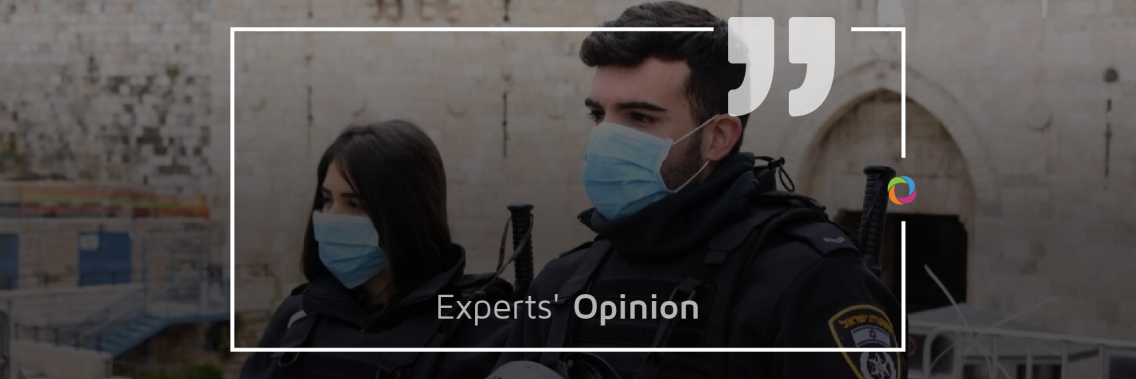The coronavirus crisis forced the governments all over the world to take immediate and drastic measures to halt the spread of the virus. The containment measures, whether full lockdown or partial confinement, have shown just how important it is to observe and effectively implement every aspect of human rights although numerous violations of those rights have been brought to light. We asked several human rights experts to share their position regarding the question: “Do you think the containment measures violated human rights?”


“Yes, the ongoing crisis and the measures adopted by governments in the name of lockdown have greatly affected various areas of human rights ranging from personal to civil liberties and socio-economic and cultural rights. Many people have been deprived of access to information, basic services and access to justice. On one hand, people cannot access basic health services and, on the other, due to the full/partial closure of courts and semi-judicial mechanisms, people are deprived of the ability to claim their rights. Labor rights are critically threatened because of the uncertainty and insecurity surrounding employment. Women and other marginalized communities have been further discriminated against and disregarded during this crisis. A number of domestic violence cases have been reported and the migrant workers who have returned to their home countries are stigmatized as potential carriers of the virus.”

“The failure of governments to safeguard this right reflects a longer-term inability to ensure the economic, social and cultural rights of people, whether through disregard or lack of resources. Thus, the pandemic is a crisis that has pulled back the veil on long standing human rights violations in countries where systemic inequalities have resulted in staggering statistics of infection and death among the poorest. Human rights are interrelated and interdependent. Pressure on governments to deliver health care – including during the pandemic and in particular to those most vulnerable – comes about through public pressure. The right to free speech and public assembly are fundamental civil and political rights that can help ensure that other rights are protected and promoted. Infringements of these rights cannot be justified in the name of public health or national security.”

“Containment measures have partially violated human rights, especially the freedom of movement, of assembly and of expression in some cases, not to mention all the other consequences of containment measures such as the rise in gender-based violence or the number of job losses around the world. Human rights restrictions must have a clear legal basis, be necessary and proportional, non-arbitrary and subject to legal review. In some countries, administrative fines for violating quarantine measures have been exaggeratedly high. If, for public health purposes, measures had to be taken to counter the spread of the pandemic, they should not however be used as an excuse to silence dissent or misuse tech data, and they need to take into account the needs of the most vulnerable groups in times of COVID-19, identified by many experts as primarily those people with disabilities, migrants, prisoners, families with low income or those who have lost their jobs.”

“The pandemic has shown how a disease impacts human beings breaking down social barriers. I’ve observed how difficult it has been to spread the respect of human rights. In addition, social programs have not been sufficient to support people in need and nor have sustainable solutions been for people dependent on small economies. The challenge is to raise awareness about everyone. Human beings are important regardless of nationality, skin, religion or social class. The world community needs effective public policies and education for peace.”

“The COVID-19 crisis generated a palette of human rights restrictions and infringements, among which are unemployment, restricted freedom of movement, a reduction of care and protection services. The causes are: the abrupt closure of care institutions and health services serving children, the widespread closure of schools that has interrupted the education of more than 1 billion children, women confined at home with abusers without access to harm reduction services and shelters. Limited access to information, challenges to freedom of expression, physical distancing, self-isolation and handwashing affected a lot the homeless, refugees. The virus does not discriminate but its effects do.”

“In the wake of the COVID-19 pandemic, governments have taken measures that restrict individual freedoms. The intention of most states in enacting containment measures was the protection of the right to health and life of its population. In order to ensure that laws were complied with, some states attached penal sanctions to them. In addition, there has been some police abuse to force the population to respect the restrictions. Taken to the extreme, the law becomes an injustice even though the WHO has never advocated large-scale restrictions to fight the coronavirus. Instead, it would have been preferable to strengthen scientific research, to increase testing, to provide masks, to properly inform citizens… instead of frightening them by constantly reminding them of the number of deaths.”

“Quarantines and lockdowns are often imposed without ensuring the protection of at-risk populations: children, women, older people, internally displaced persons, refugees, migrants, persons with disabilities, the LGBTI population. Emergency powers have been taken without review by an independent body. They are used as a basis to quash dissent or silence the work of defenders of human rights or journalists. Social distancing prevents access to economic and social and cultural rights for the unemployed, low-wage workers, people living in slums and people held in custody and institutions. Governments are failing to combat, or are promoting, xenophobia, hate and stigma based on race, nationality, socio-economic status and profession. Travel bans may have the effect of denying people the right to seek asylum. Electronic surveillance undermines citizens’ right to privacy.”

“It could be argued that strong measures, such as confinement and lockdowns, are fully justified, given the authorities’ understanding of the relative fragility of their healthcare systems and the potential human catastrophe. However, it is clear that in some cases human rights have been violated, either by insufficient understanding of human rights-based responses and/or by poorly thought-out implementation. This is especially the case where confinements failed to consider special circumstances.”

“Human rights violations in the form of censorship, discrimination based on caste, gender, religion and racism, arbitrary detention and xenophobia have surfaced and been reported across the world. Many states have failed to comply with the minimum obligation to respect, protect and fulfill human rights standards as containment measures are misused to justify restrictions on freedom of expression and speech and to violate the right to privacy. Victims of COVID-19 have also faced a wave of stigma, abuse and discrimination without an effective mechanism to ensure justice. Governments across the world have largely failed to safeguard a minimum level of human rights such as the right to food and the right to live a dignified life without stigma or discrimination. People have been denied access to health and hygiene facilities, immediate relief services and medical facilities. The poor standard of quarantine has cost the lives of many people.”

„I will stress mostly the human rights effect of COVID 19 in Africa as an example. The lockdowns have implications for freedom of movement, association, and assembly. During the curfews and lock down there are ample evidence of police brutalities meted out to civilians on pretext of violating curfew regulations. Persons who develop COVID19 and even those who recover after are stigmatised and subjected to discrimination. All over cases of domestic violence against women have increased. Child sex abuse and increase in teenage pregnancy are attributable to lockdowns. COVID 19 raises other key issues economic, social and cultural rights. Right to education has exposed the inequality of the digital world between and within countries; students from poor back ground who have no access to regular internet cannot join zoom and other internet classes which is now a common place practice. Right to work, people in the informal sector get no income when lockdown in their homes.” Nana K. A Busia, Jr


“Containment measures such as orders to stay-at-home, the closing of non-essential businesses and mandating the wearing of masks outside of the home that have been ordered by various governments to protect their populations from the highly contagious novel coronavirus do not violate human rights under well-established international and domestic law. As set forth in the International Covenant on Civil and Political Rights, the European Convention on Human Rights, and similar human rights conventions, public authorities may derogate from some enumerated human rights, such as the freedom of movement, right to privacy, assembly, speech, and association, IF that derogation is in accordance with the law and necessary to protect national security, public safety, health or morals, or the rights and freedoms of others. Those tests are met here if the dangers of a global pandemic to the life and health of others clearly outweigh the inconveniences and economic repercussions of carrying on business as usual.”
Check out more than 200 open positions in human rights sector here.


